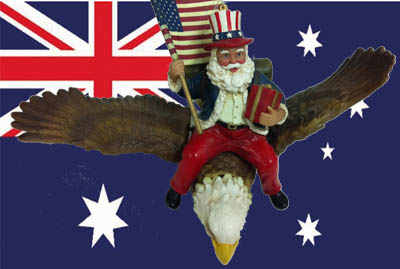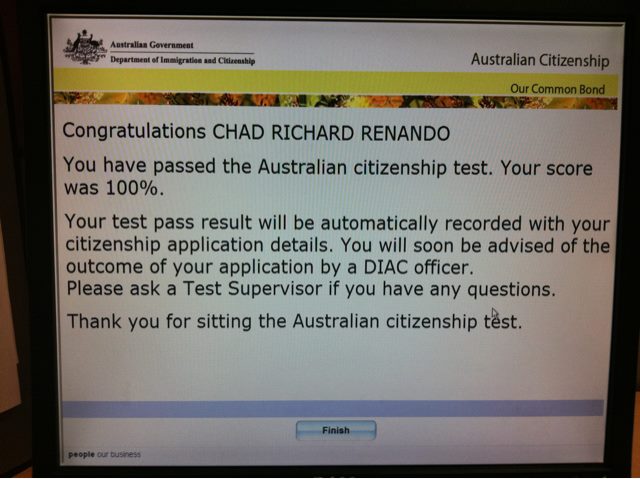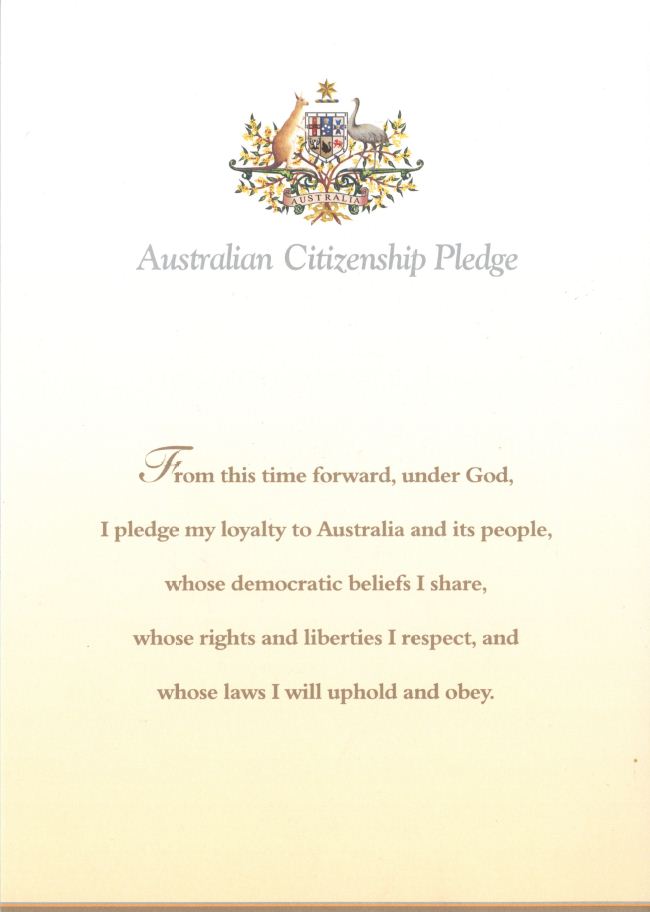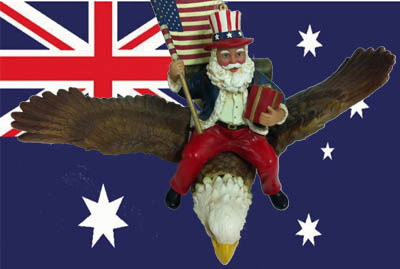An American on becoming an Australian citizen: A journey through patriotism, nationalism, and community
I have become an Australian citizen. Does this make me less American? And how appropriate is patriotism or nationalism in my new outlook? In the end, I find the extent of my Australian pride depends on how accountable I am with what has been given to me.

An American in Australia
One of my first introductions to Australian culture was in 1997 at a Bar-B-Q in Bendigo, Victoria visiting my wife’s family friends. We stood around talking, me not understanding the accent, they poking fun at Americans. They asked a question, I laughed politely, and next thing I know I had a beer in my hand.
I have experienced that common act of generosity countless times since. Australians have a way of taking the simple act of offering a mate a drink and turning it into holy communion. Having a beer or a “cuppa” is a means to say “We are the same, you and I”.
Except that I have never felt the same. From landfall in 2001, I have referred to myself in my online profiles as “An American in Australia”. I wore my unique position of American as a badge of uniqueness and difference. In a room full of Australians, as multi-cultural as they may be, I maintained a remnant of reserved American pride and a sense that I was not one of them.
For those who label this as typical American arrogance, I need to stress that the feelings are not conscious. When I went to school in Canada at the age of 14, other kids would complain about my home country with the statement “Americans are such snobs”. I dismissed the sentiment as jealous ramblings until I returned to the States three years later thinking “Man, what a bunch of snobs…”
There is a stereotyped confidence in American culture reflected in countless joke images about “the world according to Americans”. The generalised cliché goes “It is not that Americans think less of everyone else… it’s just… is there anyone else?” After ten years of living in Australia, I could no longer engage with such lines of thought as self-deprecating due to a complete dissolution in my mind of “us” or “them”.
An Australian in Australia

I took my 20-question citizenship exam, a practice not required by 95% of the population who are already Australian citizens. I passed the exam like 59,123 others before me last year and walked out of the government office with a changed perception.
I was now “one of you”. I could vote, have a say and fully participate. It was no longer good enough to be an observer with an easy-out of being “one of them”.
My decision to become an Australian was not a decision to no longer be American. I questioned and was questioned by others about whether by becoming an Australian I would still identify myself as American. By becoming a citizen, was I turning my back on my home country?
U.S. policy certainly does not encourage such actions, stating “The U.S. Government recognizes that dual nationality exists but does not encourage it as a matter of policy because of the problems it may cause”. A dual citizen can lose their U.S. citizenship if their statement or conduct is “so inconsistent with retention of U.S. citizenship that it compels a conclusion that the individual intended to relinquish U.S. citizenship”. While these cases are rare, my actions exposed the fact that I was no longer entitled to a status I had previously taken for granted.
For most, citizenship is an inherent trait like gender or eye colour. Similar to those attributes. some take it for granted, a few reject it off hand, and other embrace and celebrate it. By making a choice about citizenship, I questioned to what extent I should embrace my new status.
Patriotism versus nationalism
Social psychology makes a distinction between “patriotism” and “nationalism”. Patriotism infers a healthy dose of self-concept and love for one’s country, whereas nationalism can be associated with chauvinistic arrogance, intolerance, and desire for dominance. Patriotism is obviously the more desirable, but it is difficult to avoid the uglier form of nationalism when a group is faced with threats such as employment competition from immigration or physical attacks such as was seen after the 9/11 attacks in New York.
Patriotism increased after 9/11 as evident by a 1,713% increase in Wall Mart American flag sales. We also saw the ugly side of nationalism as politics and media celebrated war mongering and countries not aligned with the zeal were maligned such as the idiotic reference of French fries as “freedom fries”. Hate crimes rose against Muslim-Americans while crimes against other ethnicities fell.
Before we judge these actions, we must understand that we are psychologically wired for such behaviour. People attribute human emotion to the in-group and treat the out-group as less than human, resulting in in-group love and out-group hate. This aligns with system justification theory that states people are motivated to justify the fact that the system exists and they respond to threats to by increasing support of the system as legitimate and good. It is not surprising then that nationalism has been referred to as a “civil religion”.
Such sentiment exists even without significant crisis, as seen in Australian “Love it or leave it” campaigns and Facebook renditions of the movement at around 2,500 likes. My appreciation for the country is unlikely to have the same misplaced zeal, but should I wave the flag as a new citizen? What expression is appropriate so as not to be perceived as “un-Australian”?
Community and Australian pride

I became an Australian to fully participate in and support the community that supports me. No longer satisfied to operate as an outsider and “one of them”, I wanted to embrace my opportunity to become “one of us”. In doing so, I am conscious of not doing so at the exclusion of “everyone else”.
What is the difference between an American, Australian, Korean, or Iranian? For the individual, the difference can be the cosmic roll of the die determining their birth place rather than a conscious decision towards a group ideology. Even if your behaviour is reflective of your Greek, Italian, or French culture, how much of your introduction or adherence to that culture is your choice?
For those who make a choice to align their identity with the geographic region in which they reside, how much of what they identify with is a result of their own efforts? I spent five years in the U.S. Navy, but I do not take credit for the freedom espoused by many Americans. We are all here as a result of those before us. Such awareness moderates national pride with a healthy dose of humility.
I am honoured to join and contribute to a country I did not build. More than my identity as an Australian or American, however, I am becoming increasingly aware of my role in a wider perspective of humanity. National boundaries help organise and direct a group of people for a common good. They are also responsible for expressions of insecurity, blame and hatred.
I am now one of you. My pride in being an Australian will be based on how accountable I am for the responsibility given to me.


You are a lucky man to have found your place in the world, some wander their entire lives and never figure it out. I imaging this was not an easy decision to make, but probably one that brought peace once it was made. Hope all goes well, and don’t forget to visit once in a while.
I’m really wanting to move my entire family there. I’ve never been there. But, I’ve also moved and thrived in places in the states that I have happened upon. Things(politics, economy, moral, etc.) in America have just taken a turn in such a way that I truly believe will be repairable. That’s just a hunch. But it’s a hunch that keeps me a wake at night.
I have a good paying job, and a family. Fortunate enough to say I’ve been employed at the same place for 14 years. But I just almost don’t feel safe here anymore.
I even asked my “old fashioned” staunch republican American father if he’d thought of it “unAmerican” if I’d move out of the country. He told me that he wouldn’t think that at all.
Hi Chad. I know this is an older post, Randomly I happened to come across it. I wish yourself and family the very best. I also hope that you are as happy as can be! “Should I wave the Australian flag as a new citizen? What expression is appropriate so as not too be percevived as so called Un Australian?”. Just be your own beautiful self. Stay true to yourself your own beliefs and what is most important to you. And using common sense being as respectful as you can too others also. At the end of the day no matter what we are only human beings and in Reference to yourself Personally I don’t believe where you were born makes a difference. What I do believe can are your own stories, lessons the ups and downs along the way. The adventures you have experienced, the ones you continue too experience and so on. I think that you have a wonderful story. In fact many to tell should you wish too share them. You are an American citizen and you decided to become an Australian one too. Good stuff! All the very best to you!